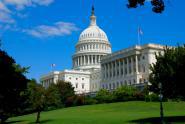Climate Change Report Gets Cold Reception on Capitol Hill

A new report that says climate change is a matter of
national urgency is getting a cold reception from
leaders of the House Energy and Commerce Committee. The
National Climate Assessment and Development Advisory
Committee says that the evidence of the earth’s warming
is becoming more apparent.
But the odds of any federal legislation that would be
enacted to combat such effects are nil. That’s because
the two political parties, generally, are sharply
divided over whether man-made emissions are the central
cause behind the gradual warming trend. Most Republicans
and some Democrats say that the phenomenon can be
attributed to natural causes in weather cycles.
To that end, the House Energy and Commerce Committee’s
Republican-dominated leadership has said that it will
not consider any proposal to reduce greenhouse gas
emissions. If technologies improve and they would become
commercially available, then that would be the
market-wise thing to do. Specifically, those leaders are
saying that any resurrection of the carbon tax idea
won’t happen.
Similarly, President Obama is saying that his
administration is not going to get bogged down in trying
to enact a carbon tax. However, unlike the House
Republicans, the president believes that government
regulations can lead to fewer heat-trapping emissions
and that such rules would accelerate those tools that
could lower those releases.
“Evidence for climate change abounds, from the top of
the atmosphere to the depths of the oceans,” says the
60-person federal advisory committee that authored the
draft
climate report. “Certain types of weather events
have become more frequent and/or intense, including heat
waves, heavy downpours, and in some regions, floods and
droughts ... These changes are part of the pattern of
climate change, which is primarily driven by human
activity.”
Last year was the hottest year ever recorded in this
country, according to those who track such things. It
was also among the 10 hottest worldwide. The draft
report issued by the federal advisory committee says
that unless steps are taken to reduce heat-trapping
emissions that global temperatures could rise by as much
as 10 degrees Fahrenheit over the course of this
century.
“Climate change is already affecting us and there’s a
growing demand at the local level for information about
what it means for our present and our future,” says Todd
Sanford, a scientist at the
Union of Concerned Scientists. “The climate
conversation always starts with science. Because
policymakers have generally supported policies that
increase emissions, successfully adapting to climate
change is becoming more difficult.”
New Thinking
The political opposition to crafting any legislation to
deal with climate change is too formidable, meaning that
any such bill could not make it to the House floor for a
vote. Meantime, Democrats from coal-producing states are
also opposed. Two West Virginia lawmakers have
co-authored a measure that forbids any federal carbon
tax on electric or transportation fuels.
Rep. David McKinely, R-WV, has joined with Rep. Nick
Rahall, D-WV, to say that a carbon tax would increase
the price of all energy forms. It is therefore not a
tenable solution in today’s economic environment.
However, in some conservative circles, there is support
for a carbon tax. Former Secretary of State George
Schultz has said that British Columbia has implemented a
carbon tax whereby its government will gradually
increase it before redistributing the revenues to
individuals. So, it is popular. He adds that Republican
lawmakers may want to take up this measure to regain its
standing as the party that has adopted and enforced the
original 1970 Clean Air Act.
“Conservatives have the answer to our energy and climate
challenge,” adds Bob Inglis, head of the
Energy and Enterprise Initiative and a former
Republican lawmaker from South Carolina. “It’s about
correcting market distortions and setting the economics
right. We need to stop retreating in denial and start
stepping forward in the competition of ideas.”
Despite the disagreements between the parties and among
conservatives, companies are moving forward to reduce
their carbon footprints.
Calvert Investments discusses Google, AT&T and
Coca-Cola. Google, for instance, publicly lists its
renewable energy holdings as well as its carbon
footprint that it wants to reduce to zero. Meanwhile,
AT&T also has a goal of increasing its green energy and
decreasing its greenhouse gas emissions by 20 percent by
2020. Coca-Cola has pledged 5 percent cuts in all of its
emissions by 2015.
By any measure, the earth is warming. The president has
his ideas while House leaders have theirs. And whether
one attributes this to man-made greenhouse gases or
natural weather cycles, it is undeniable that major
parts of the marketplace are making their own moves.
EnergyBiz Insider has been awarded the Gold for Original
Web Commentary presented by the American Society of
Business Press Editors. The column is also the Winner of
the 2011 Online Column category awarded by Media
Industry News, MIN. Ken Silverstein has been honored as
one of MIN’s Most Intriguing People in Media.
Twitter: @Ken_Silverstein
energybizinsider@energycentral.com
Copyright © 1996-2013 by CyberTech, Inc. All rights reserved.
To subscribe or visit go to: http://www.energycentral.com
To subscribe or visit go to: http://www.energybiz.com